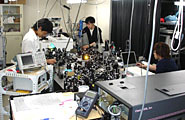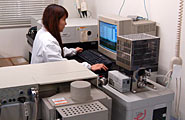Program in Chemistry
The first goal of education in the programs is to provide the students with deep understanding of the properties, structures, and functionalities of materials based on the insights afforded by the knowledge of their chemical characteristics. In the further course of study we aim to equip the student with a more extensive and more profound understanding and expertise in a field that can roughly be divided based on the scale of the objects of interest, into three areas of macro (materials) chemistry, nano-chemistry and molecular chemistry. The basic chemistry department aims at a comprehensive inquiry into the synthesis, qualities, reactions, and functionality of materials according to fundamental chemical principles. The objective is to impart sufficient knowledge and ability on students to fulfill a future role as researchers or educators in chemistry by guiding them in the design and investigation of molecules and materials with completely novel functionality. The department of applied chemistry is mostly concerned with materials chemistry and environmental science. The student will become acquainted with research on inorganic and organic materials and the processes involved in the circulation of chemical substances in the environment. The objective of the department is to provide sufficiently firm knowledge and flexible competence to enable the students to participate in the development of useful products in a wide range of chemistry related problem settings .
Course in Chemistry

Cutting edge research tool - the ultrafast time-resolved spectroscopy apparatus.
The education and research in the chemistry department take as the starting point a question that is as simple as it is profound. We ask “What is a substance?” and attack the question from a scientific point of view. Materials, both organic and inorganic, are investigated in this area: the structure of molecules and the constitutive atoms are examined in detail and new materials are synthesized, all with a view to discover new substrates with novel functionality. Some 18 million different substances are known and it is very important for contemporary society, where they are actually used, to meticulously research their properties, structure and effects. The educational object of the department is to foster members of society with a broad vision, who have the required knowledge and skills to fulfill roles as researchers, educators, and engineers working in chemistry or some related scientific specialty on its periphery, and to develop their capacity to discover problems and solve them. They should also have a clear idea of what the role of ‘chemistry’ in the natural sciences is. To efficiently achieve this objective, the department not only holds specialized lectures, but also invites experts from outside of the university for special talks, and organizes reading seminars and research colloquia in each laboratory. To complete a master’s thesis, the student is expected to tackle a research problem that will lead him or her to the forefront of the discipline.
Course in Applied Chemistry

Measurement of a circular dichroism spectrum.
Education and research in the applied chemistry department aim to develop the themes of materials science and environmental chemistry from an engineering point of view. The course is divided into the four areas of organic molecular engineering, chemistry of organic materials, chemistry of inorganic materials, and analytical & environmental chemistry. In these areas, the topics of special interest include research on the properties of organic molecules such as functional dyes and pigments, supramolecules, and so on; the development of useful organic materials such as chiral compounds and liquid crystals, organic polymers; the development of inorganic materials, in particular of catalysts, ceramics and materials for electrodes used in industrial electrolysis; the development of high performance and functionalized analytical separation methods using chromatography and electrophoresis, research into the pollution of air and soil. Education in this course leads from a thorough exposition of the basics to instruction that introduces the students to the frontiers of research in each area and has the ultimate aim to produce graduates, who possess a high level of expertise in each area, who are able to independently design strategies for the development of materials that are, from a global point of view, in harmony with the environment, who are fully aware of the responsibility of the scientist and engineer in society and who are able to think in an international context. For this purpose we emphasize not only the teaching of the science itself, but also strive to enhance effective communication through oral presentation and discussion of research results, and the skill of writing research papers.